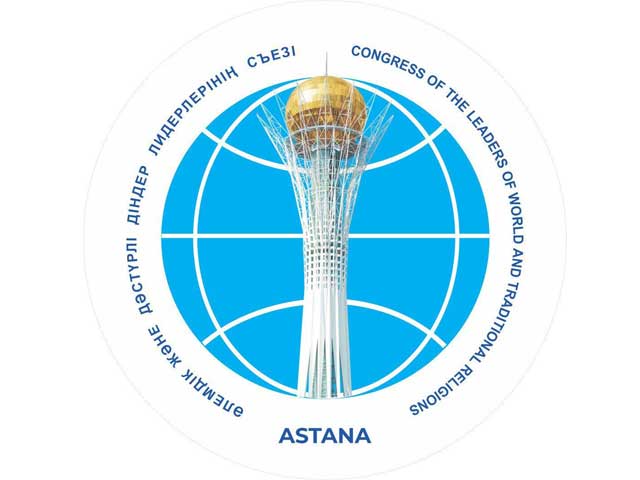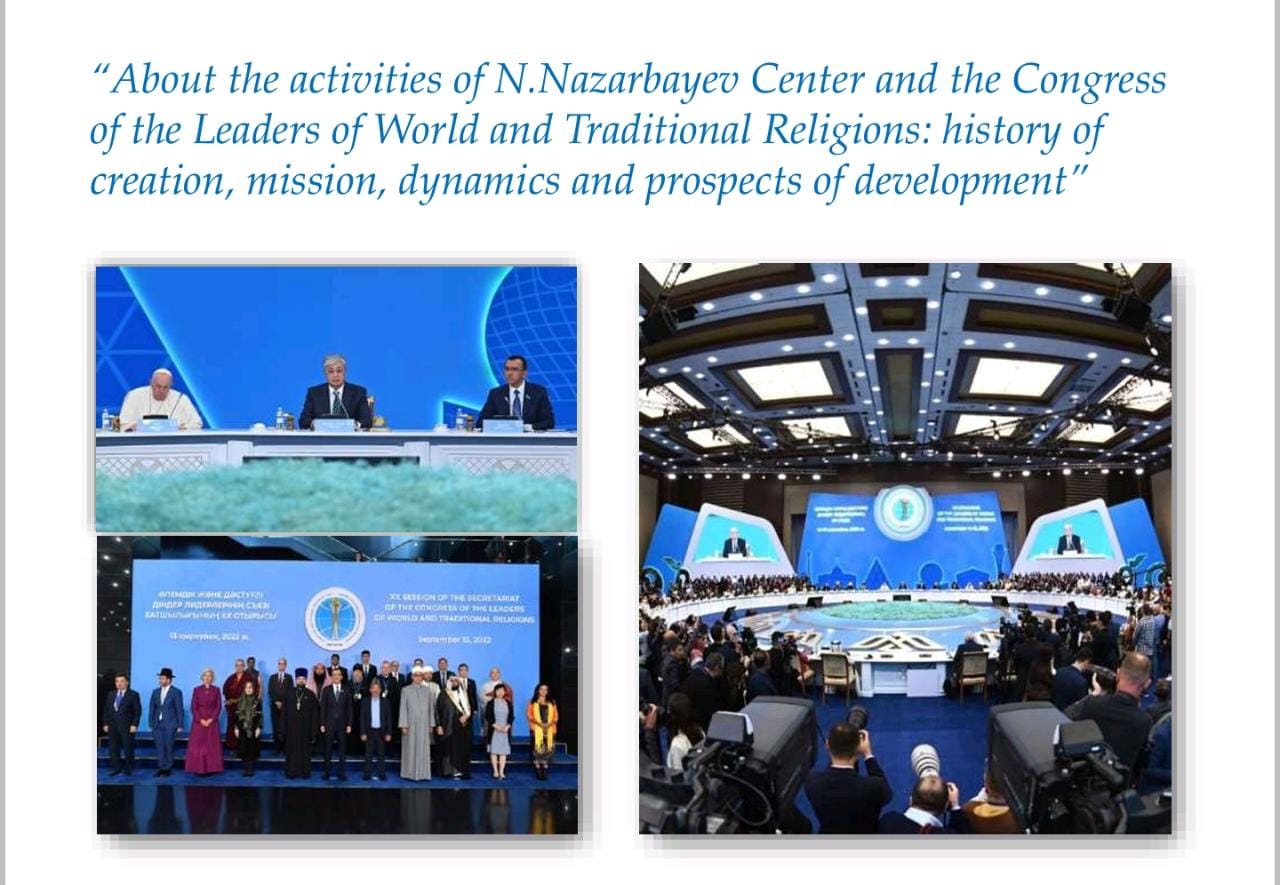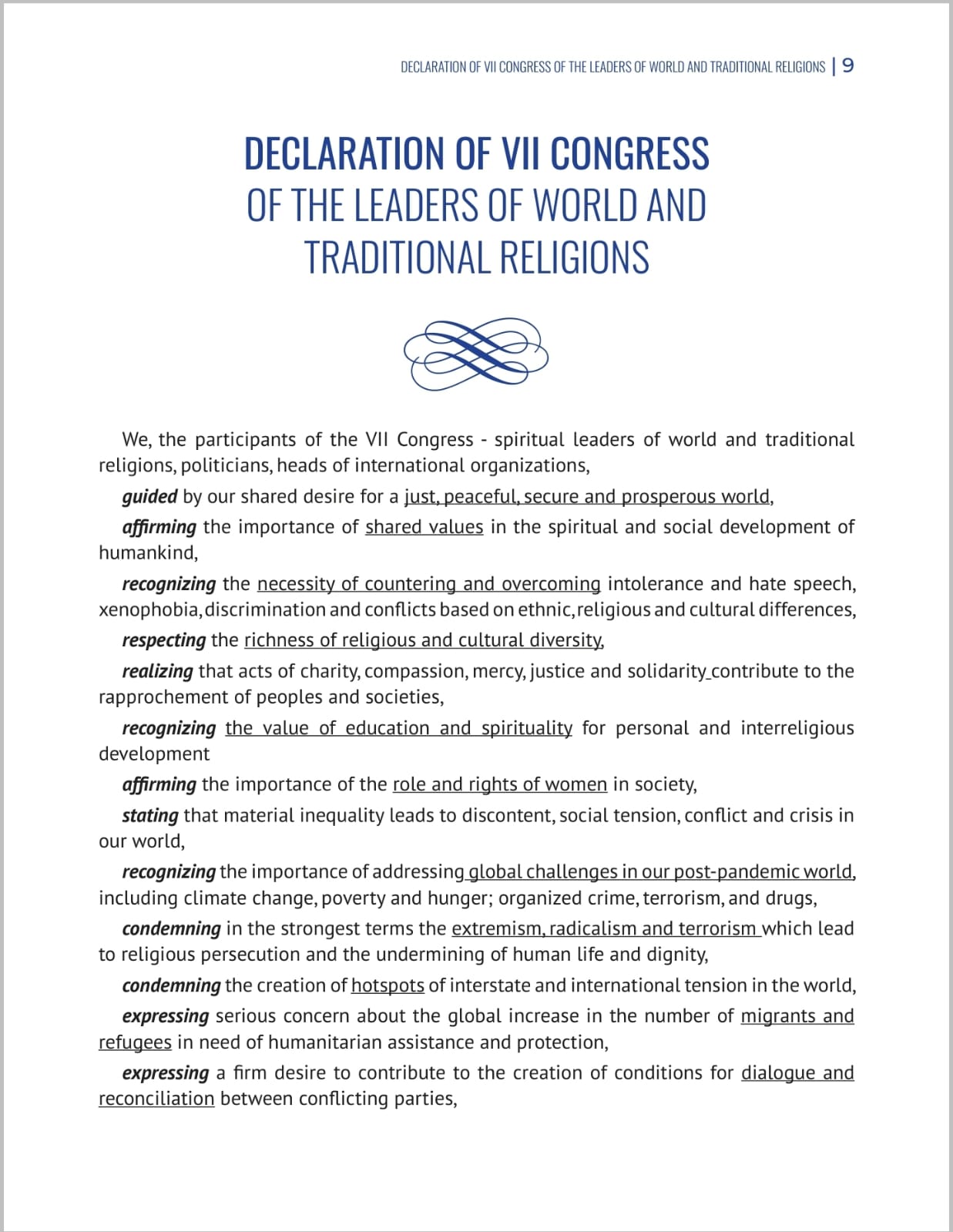Information about of the N.Nazarbayev Center and the Congress of the Leaders of World and Traditional Religions: history of creation, mission, dynamism and prospects of development.
N. Nazarbayev Center for Development of Interfaith and Inter-Civilization Dialogue was established in April 2019 at the initiative of the participants of the VI Congress of the Leaders of World and Traditional Religions.
The Center is an international platform for holding sessions of the Congress and its institutes – the Secretariat of the Congress and the Working Group, aimed at interaction with international structures, domestic and foreign religious organizations, and their spiritual leaders.
At the same time, the Center’s work is aimed at analyzing the state and dynamics of the development of the religious situation in Kazakhstan and the world. One of the strategic units of the Centre is religious expertise and research on current topics in the field of religion and public-religious relations.
It is important to note that the Center is currently working to actively and consistently promote the ideas of the VII Congress of the Leaders of World and Traditional Religions and its Declaration on the international information and intellectual agenda: expert meetings on interfaith dialogue, international conferences, round tables with the involvement of representatives of state bodies, the expert and scientific community, religious associations and international organizations that are covered in foreign and domestic media, as well as in social networks.
In September 2003, in the capital of Kazakhstan, the First Congress of Leaders of World and Traditional Religions was held, attended by only 18 delegations of spiritual hierarchs (*representatives of Islam, Christianity, Buddhism, Judaism, Taoism and Shinto) and honored guests from 17 countries in Europe, Asia, Africa and America.
The Congress outlined the outlines of the interreligious dialogue platform, defining the benchmarks for the future Astana Interreligious Summit.
The First Congress took a decisive step towards strengthening understanding and harmony among religious figures and establishing a constructive and sustainable dialogue among civilizations, faiths, countries and peoples.
Key priorities of the Congress were defined:
– affirmation of peace, harmony and tolerance as inviolable principles of human existence;
– achieving mutual respect and tolerance among religions, faiths, nations and ethnicities;
– preventing people’s religious feelings from being used to escalate conflicts and hostilities.
Goals of the Congress:
– the search for universal reference points in the world and traditional forms of religions;
– functioning of a permanent international interfaith institution for the dialogue of religions and the adoption of agreed decisions.
The key priorities of the Congress of the Leaders of World and Traditional Religions is not a simple situation, but a system of key targets and criteria, in which the main mission and feature of the Astana Interreligious Summit is concluded.
Kazakhstan was the first in the entire post-Soviet space to choose a global format of inter-civilization and interreligious dialogue.
It should be emphasized that none of the major leaders of the 21st century took the opportunity to initiate the creation of a long-term global strategy to strengthen and promote inter-civilizational, inter-religious and inter-confessional dialogue, and apply it to convene and organize effective activities of the Congress of the Leaders of World and Traditional Religions.
As you know, in September 2022, the Seventh Congress of the Leaders of World and Traditional Religions was held, the quality of the participants and their geography for these 20 years has expanded significantly.
More than 100 delegations from 50 countries of the world have already arrived in our country. As participants and guests of honor of the Congress, such spiritual leaders were invited as: Head of the Vatican and the Catholic Church, Pope Francis, Supreme Imam of the ancient Islamic University al-Azhar, highly respected doctor, Sheikh Ahmed at-Tayeb, Chairman of the Caucasian Muslims Office Sheikh-ul-Islam Allahshukur Pashazade, His Holiness and Beatitude Patriarch of the Holy City of Jerusalem, All Palestine, Arabia, Syria, Obonpol (two banks) of the Jordan, Holy Zion and Cana of Galilee Theophilus III, representatives of the Russian Orthodox Church, Chief Ashkenazi Rabbi of Israel David Lau and Chief Sephardic Rabbi Yitzhak Joseph, as well as representatives of authoritative international organizations and influential political figures.
To cover the Seventh Congress, 568 media representatives, including 262 foreign ones, were accredited, including 182 foreign media representatives from 70 countries (such as BBC, TASS, ASSOCIATED PRESS, Reuters, VGTRK, France Press, Euronews, etc.) and 81 representatives of the Vatican media.
Within the framework of the Seventh Congress, a large-scale religious mass was held with the participation of Pope Francis, who arrived in Kazakhstan on an official visit to participate in the Seventh Congress of Leaders of World and Religious Religions. About 7,000 people gathered in the capital for the holy mass.
Thousands of pilgrims from the regions of Kazakhstan, Far and Near Abroad took part in the prayer dedicated to the Feast of the Exaltation of the Holy Cross. Among them were Romania, Germany, Poland, Russia, Uzbekistan, Kyrgyzstan, Mongolia, Azerbaijan, Georgia, Turkmenistan, Belarus and Tajikistan.
The Pontiff’s support for Kazakhstan’s initiative to hold the Congress of the Leaders of World and Traditional Religions has multiplied the international prestige of the Kazakh state.
On September 16, Supreme Imam Sheikh Al-Azhar Ahmad Tayeb delivered a sermon at the Republican Main Mosque under the SAMK. The Sheikh preached to those present about the value of unity and peace, the values of Islam and the spiritual integrity of the Muslim Ummah. Sheikh al-Azhar’s sermon was attended by more than 20,000 people. In addition, the sermon was broadcast live on the official YouTube channel of the Spiritual Administration of Muslims of Kazakhstan.
At the conclusion of the work of the Congress, the final document of the Astana Interreligious Summit was adopted – the Declaration of the VII Congress, the ideology and content of which reflects the whole spectrum of vision of the topical problems of the modern era, possible ways of their resolution, as well as the intentions of leaders of world and traditional religions, their appeal to the international community.
Summarizing the addresses and speeches of the participants and guests of the Congress, it should be noted that:
– dialogue and consent of the spiritual hierarchs, their mutual respect and tolerance, harmony and solidarity become one of the fundamental verdicts of ensuring the architecture of a secure global world;
– universal spiritual values and the principles of international cooperation will provide the foundation for the development of a sustainable future for societies and States.
The significance of the Declaration is that this document distributed as an official document of the 77th session of the UN General Assembly.
During its 20 years of multifaceted activity, the Congress of Leaders of World and Traditional Religions has developed, systematized and formed a solid and informative documentation base on the interaction of different religions.
The Congress of the Leaders of World and Traditional Religions has adopted five (5) Declarations and two (2) Addresses. These comprehensive documents reflect the shared vision of religious leaders, parliamentarians and experts on the multifaceted challenges of the modern era.
The final documents of the Congresses are unique in that the religious leaders themselves participated in their elaboration.
Assessing the results of the 20-year activity of the Congress of the Leaders of World and Traditional Religions, it can be noted that the key priorities proposed by the First Congress are based on world practice. For this is the combined experience of many leading states of the world, comprehended by religious leaders of all confessions and creeds, on the basis of which the key priorities for the development of the Astana Interreligious Summit, with its features and specifics, have been created.
The Congresses of the Leaders of World and Traditional Religions at each stage of their work not only presented new horizons to modern mankind, identifying actual ideas and fresh challenges, Providing stability and continuity of the strategy of the intercivilizational and interreligious dialogue, but also showing concrete ways and mechanisms of its implementation.




